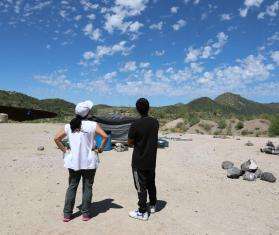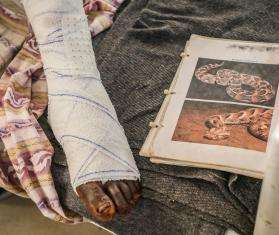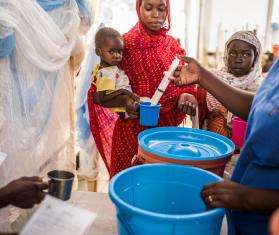In Somalia, women and children undertake arduous journeys for hundreds of miles to reach medical facilities, and pervasive insecurity along the way frequently obstructs their access to care. This can lead to critical delays that exacerbate health conditions and can even cause death.
“Seven months ago, my wife gave birth to twin boys,” said Kalimow Mohamed Nur, a father whose sons are under treatment at Bay Regional Hospital in Baidoa, which is supported by Doctors Without Borders/Médecins Sans Frontières (MSF). “She experienced excessive bleeding during delivery, but I had no money to take her to the hospital. Our village lacks a free health facility. While I was caring for her at home, the babies also fell ill. I took a loan of about $130 and we traveled 185 miles from my village to Baidoa to seek free care.”
Kalimow's wife survived the bleeding and after seven months, he managed to bring his sons for treatment. But there are hundreds of women and children who cannot seek medical care in Southwest state of Somalia. The persistent conflict in the region creates a precarious situation for anyone in need of critical health care.

Socioeconomic and security barriers to accessing medical care
Many people in the Bay region of Somalia live in poverty, which makes it difficult to afford health care services and transportation to reach secondary health care services. The cost of transportation—up to $300 in some cases—can be prohibitive, forcing many to delay or forgo essential medical care, leading to high rates of illness and death from preventable diseases.
People in the Bay have been facing significant health and humanitarian challenges due to prolonged conflict, chronic instability, and climatic shocks leading to severe droughts and flash floods. The crumbling health care system further exacerbates the situation, leaving women and children the most vulnerable. The challenges they face in accessing health care are multifaceted, involving security, economics, culture, and infrastructural barriers.
Cultural norms and traditional practices play a substantial role in health care access. In many families, men make the health care decisions, leaving women without autonomy to make decisions about their own health and medical procedures. This delay in decision-making can lead to late arrivals at medical facilities. Additionally, a general mistrust of modern medical practices coupled with low rates of health awareness hinder the adoption of preventive and curative health care measures.
“There has been a widespread belief that undergoing surgery results in children being exchanged with others, leading many to refuse hospital treatment,” said Habiba Mohamed Abdirahman, a traditional birth attendant in Baidoa. “Moreover, common misconceptions about blood donation include fears about health risks associated with donating blood, concerns about religious or cultural taboos, and misunderstandings about the medical process.”
The main causes of death for pregnant women are blood-pressure-related complications, hemorrhage, and sepsis. All these conditions can become deadly if they are not treated in a timely manner. Delayed access to health care increases the chance of death for the mothers and their babies.
Maternal and child health are a growing concern
Most maternal and pediatric deaths stem from delays in seeking care. Delays in deciding to seek safe delivery services, reaching a health facility, and receiving prompt and suitable care upon arrival contribute to maternal and child mortality rates. Somalia has one of the highest maternal mortality rates globally, with 621 deaths per 100,000 live births, and one of the highest child mortality rates, with approximately 137 deaths per 1,000 live births.
The health care infrastructure in the region is underdeveloped and suffers from a critical shortage of trained medical professionals. The few facilities that exist in Baidoa and at the periphery are often overwhelmed, particularly during emergencies and disease outbreaks. The region's health care system struggles with limited resources, including human and financial resources, essential medications, and medical supplies. Ongoing conflict further complicates the delivery of health care as it remains out of reach for the majority of people in conflict-affected and inaccessible areas.

More international engagement is needed
“The current state of maternal and child health in the Bay region calls for immediate attention,” said MSF’s head of programs in Somalia, Dr. Pitchou Kayembe. “MSF calls upon national authorities and international organizations to invest more in strengthening the health system, both at primary and secondary levels, by allocating enough resources to improve access to health care for women and children in the Bay region.”
“Maternal and neonatal deaths can be averted by making it possible for pregnant women to access prenatal care closer to their homes, reducing late referrals for complicated cases, and increasing the number of women delivering in a health facility by raising awareness about available services. At the same time, vaccination coverage and nutrition screening and support must be expanded. This is only possible through increased financial support, community engagement, and improved cold chain infrastructure.”
While the efforts of MSF and other organizations have significantly improved health care access and outcomes, continuous support and enhancement of these programs are essential. Strengthening the health care system, increasing health literacy, and addressing socioeconomic barriers can pave the way for better health outcomes for the women and children of Baidoa. The continued support of the international community is essential to sustain, expand, and decentralize health services.

MSF’s work in Bay, Somalia
Since 2018, MSF has been supporting the Bay Regional Hospital in Baidoa, providing a range of medical services to improve maternal and child health and respond to disease outbreaks. MSF provides comprehensive emergency obstetric and neonatal care, ensuring safe births and offering both inpatient and outpatient care for pregnant women and their newborns. The teams assist approximately 200 deliveries each month. Additionally, MSF runs seven outreach sites near camps for internally displaced people to provide primary health care and ensure timely referrals to secondary health care services.




